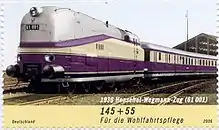Wegmann & Co.
The form coach factory of Wegmann & Co. was founded in 1882 in Kassel (then Cassel) by Kommerzienrat, Peter Wegmann, and Richard Harkort as the Casseler Waggonfabriken von Wegmann, Harkort & Co. In 1886 it changed its name to Wegmann & Co.
.jpg.webp)
In 1912 the company was taken over by engineer, August Bode, and businessman, Conrad Köhler. Towards the end of the First World War, in 1917, the firm was given an order for the construction of the first German tank, the K-Wagen. In the 1920s the construction of railway wagons was the focus of the company. The firm became known in the 1930s as the manufacturer of passenger coaches for the Henschel-Wegmann train. In 1936 Wegmann & Co supplied the prototypes of the so-called Schürzenwagen. In addition, Wegmann built some of the state coaches of the special train for the Führer, which were used by Adolf Hitler.
In 1925 the 4/20 PS sports car was displayed at the German Automobile Exhibition in Berlin. The vehicle was designed with a streamlined wooden body that was covered with artificial leather. It had seating for two to three people. In the boot was a water-cooled, two cylinder, 1,000 cm³ boxer engine, which generated 20 horsepower. It is not known how many were built.
See also
- BKK Herkules, founded in 1888 as Betriebskrankenkasse Wegmann & Co.
Literature
- Thomas Vollmer, Ralf Kulla: Panzer aus Kassel. Die Rüstungsproduktion der Firmen Henschel und Wegmann. Prolog Verlag, Kassel, 1994, ISBN 3-88122-996-5.
- Werner Oswald: Deutsche Autos 1920–1945, 10. Auflage, Motorbuch Verlag, Stuttgart 1996, ISBN 3-87943-519-7, S. 462.
- Ulrich Kubisch: Deutsche Automarken von A–Z. VF Verlagsgesellschaft, Mainz, 1993, ISBN 3-926917-09-1.
